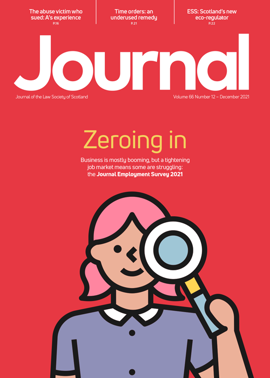Book reviews: December 2021
A Mediator's Musings: on Mediation, Negotiation, Politics and a Changing World
John Sturrock QC
INDEPENDENTLY PUBLISHED
ISBN: 979-8640163988
PRICE: £7.99; E-BOOK £4.99
As the UK hunkered down in the first lockdown in March 2020, John Sturrock QC published A Mediator’s Musings to pierce the gloom and give us food for thought. A recurring theme in this collection of short newspaper columns and blogs is the unifying power of sharing a meal together. This particular miscellany is more street food or tapas than formal banquet. The evident intention of some of the pieces is to be conversation starters rather than definitive pronouncements.
Approaching the booklet as a concept album (in keeping with Sturrock’s music references), the intro is a series of Reflections and the outro thoughts on why the pandemic sharpens focus on what we learn from the tracks in the middle – Negotiation, Mediation and Politics. The lively central Mediation section presents or reacquaints readers with the dynamic, tools and capabilities of resolving disputes in the non-anxious presence of a skilled mediator.
The Japanese tea ceremony which Sturrock extols in an early piece has features in common with mediation: an arranged bringing together of parties in convivial surroundings with elements of ritual and reliance on the tea master’s discernment and guidance on attractive teas and utensils best suited to promoting a harmonious time together. In his cricketing metaphor piece, the writer places at the top of the list of effectiveness as mediator “an ability to focus on the process regardless of the outcome”, and “an ability to operate with consummate skill in the moment”. The latter attribute combines emotional intelligence, rational analysis and positive interactions.
Confidentiality, and some prudent preservation of mediation knowhow, inevitably means that the tales cannot be told in full. Nonetheless, the vignettes are vivid and practical. So, a dodgy curry consigns the travelling mediator to a minimal role, and “less is more”; a respectful hearing of the “other lawyer’s” viewpoint, profoundly at odds with the hearer’s perspective, creates understanding that yields progress; a late evening urging that parties continue to grapple with underlying relational and practical realities deflects a defeated walk away from talks.
The informative table at p 41 is a helpful demonstration of how joint sessions can build momentum in a mediation. It is also a neat example of how choosing an effective medium can convey an effective message.
Exploration, and indeed provocation, by the use of open questions is a leitmotiv across the various pieces. These in turn prompt helpful musings of our own. Less successful, for this reader at least, are the articles or blogs where Sturrock invites us to deplore Brexit realities or embrace positive views on Scottish autonomy or independence. Of course, austere abstinence from political views is not required of a musing mediator. These political think pieces, in their inevitably compressed format, are however less well developed than others in the collection. The sustained narrative of “Neil Armstrong called it on Information Overload” shows how stepping away from a more personal viewpoint enriches both the political analysis and the overall perspective gained from the book.
What then will be our own musings in light of this collection? Is mediation necessarily a more honourable and respectful process than adversarial debate, properly conducted? Is “kindness” an accurate description of the actual driving force behind it? Would “enlightened self-interest” be a misdescription, as reductive as it is sceptical?
The values quoted from Scotland’s National Performance Framework and the Edinburgh Declaration of International Mediators are inspiring and constructive. In honouring dignity, civility and a search for common good, we are more likely to achieve a lasting peace, not just a temporary truce, in our polarised world.
In a piece entitled “Mediation: what makes the difference?” the writer ruefully reflects on the parties’ rejection of the mediator’s suggested pragmatic compromise, the talks at an end. A book on his desk adds its own rebuke by its provocative title: Never Split the Difference. That book’s author, Chris Voss (an FBI hostage negotiator), in a Swiftian inversion suggests that “Getting to No” is more revealing – and mutually empowering – than the Fisher and Ury framing of “Getting to Yes”. How will we accurately survey the land of “common interest” and deal with those with whom we, sometimes profoundly, disagree? These are important questions and John Sturrock’s slim volume is a thoughtful resource for those keen to seek realistic answers.
Eric Robertson, advocate
Regulars
Perspectives
Features
Briefings
- Criminal court: OLRS – life means life
- Corporate: Will a deal impact on national security?
- Intellectual property: IP and AI – the latest
- Agriculture: Securing successor crofting tenant status
- Succession: Back of an envelope – testamentary intent?
- Scottish Solicitors' Discipline Tribunal
- Data protection: Google off the hook
- Property: Beautifully presented tedium
- In-house: Lawyers in uniform
In practice
- Your Law Society of Scotland Council members
- Legal services regulation reform – have your say
- The Word of Gold: Whither goest thou?
- Coaching: help in a fast changing world
- The earlier the better
- Family mediation accreditation: a view from the panel
- The Eternal Optimist: Just to say thanks…
- Appreciation: Albert Vincent Sheehan
- Ask Ash: A broken work circle






